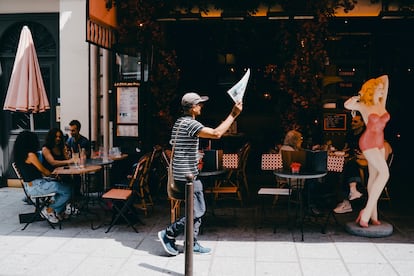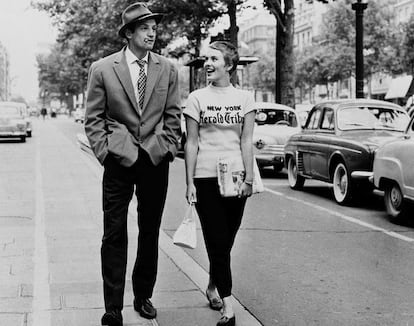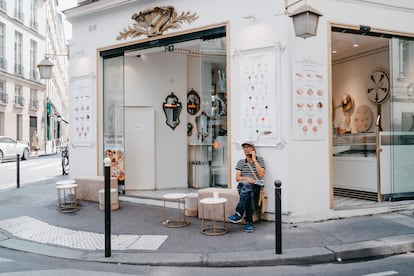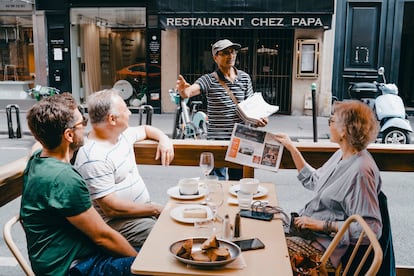A soft and wave guy, touched with a baseball cap and thick brown pasta glasses, carefully support his bicycle against a lamppost next to Café Hibou, in the Parisian odeon. In a soft gesture, put the hand inside a plastic bag and draw a small wad of newspapers that is placed under the arm. As if it were about to get up the curtain, the guy takes air and throws: “It’s here! Bayrou has solved France’s problems. We are saved. Buy The world! ”The function begins.
Ali Akbar, 72 -year -old Pakistani, is the last street vendor of newspapers in Paris, although the name in French is much more poetic: crier (Shout). For more than half a century, he has been traveling about 15 kilometers a day among the alleyways of the Latin Quarter of Paris offering newspapers in squares, restaurants and nightclubs. Ali arrives from Antony, in the suburb South of Paris, at noon. Start at one, when it reaches the kiosks The world (Its edition is evening), and does not go home until the last copy flies. Whether eight, nine or ten o’clock at night. From Café Fleur to Les Éditeurs, going through the brasserie Lipp to the Faculty of Sciences Po where, for years, when it came to dispatch more than 250 newspapers, he found his main clients among students of impatient policies to know what was happening in the world.
Akbar started half a century dispatched the satirical newspaper Charlie Hebdo y Libération. Later, when the students began to ask for it, they went to The world In a city where about 40 scientists The corners of the main neighborhoods were distributed trying not to step on the territory of the other. A profession that could reach its time of splendor in the Paris of the 60s, when Jean Seberg served among the cars of the Elysées fields in At the end of the getawayby Jean Luc Godard, with several newspapers under his arm shouting “New York Herald Tribune! While Jean-Paul Belmondo persecuted her, frustrated because he did not find the horoscope in that newspaper.
Other times. Especially in the Latin Quarter, then Apache territory of intellectuals out of the École Normale Supérieure, poets, actors and nights in white. Akbar’s life is also a kind of city’s cultural health thermometer, and the Russian mountain of the journalism industry. “This place has changed a lot. Before it was like a town, a neighborhood with Alma. Now there are only money, tourists. Libraries are now clothing or luxury stores. And my clients, or who should be, do not read. Or read only on their mobile, digital,” he says.
Akbar left his native Pakistan by boat, without a penny, and crossed half the world before arriving in Paris. He learned French on his own, slept a lot of time on the street, and tried a thousand times to find work. “Thanks to an Argentine, I could start selling newspapers on the street,” he recalls. But there was everything. And the memories of the worst moments still return, of discrimination. Therefore, he confesses, continues in the same neighborhood after half a century. “I am very sensitive, and at first I had a bad time. The street is hard, and many people treated me like a beggar. Now here they know me, they love me. And if I went to another neighborhood I would have to start over,” he says.

Ali is an institution in the neighborhood. Everyone knows him. Many leave him an extra ticket with the newspaper or invite him to lunch while chatting with him for a while. At 17.00 on Wednesday, after having coffee in Le Hibou, he gets back to the bicycle and continues his journey, first for the Boulevard Saint Germain, then turns to Saint Supplico Square, where he enters the Mairie Café. Many passed here. Politicians, like Emmanuel Macron (“When I was a student at Science-Po, I invited me to a coffee”), Hubert Védrine, Edouard Philippe, or Jean-Louis Debré. Intellectuals such as Jean-Paul Sartre, or artists such as Catherine Deneuve and Vincent Lindon. All bought newspapers.
The old temples of intellectuality, however, are barely received from writers or artists. If one entertains, observing, perhaps he can see the Danton to Antoine Gallimard, to Régis Debray sitting in Les Éditeurs or some of the very young talents of the magazine Grand Continent dispatching some pints at the Café de la Mairie with its inalienable costumes and ties. Little else. “He Two magots It ends, and recently, also the Flora coffee and the Rue de Buci. Too many foreigners. “It’s here! Bayrou has arranged France,” he shouts.
One of the brands of the house of the latter Mohican of the trade are the jokes, some provocative, other whiter, to attract the attention of their potential clients. “There is already! Putin has finished war and has asked for forgiveness,” he shouted a few days ago between the coffees tables.

Today your main newspaper is The world, although it sells some others by order. He earns about 50 euros on an average day; You rarely take a day off, seven about seven. He keeps him safe that reading the newspaper remains a relatively entrenched custom in France. Some friends buy two or three copies and give him 10 euros, or invite him to lunch.
Akbar is a star between the students and the usual ones in the neighborhood, who came to make a collection so that a food truck To sell food in the Luxembourg gardens. The experience ended badly. He was scammed, he counts as he walks pushing his bicycle along the margin of Rue du Seine. But Akbar is already a monument in this neighborhood. And President Emmanuel Macron recently granted him the Legion of Honor, the highest distinction of the Republic, which will be conferred on a ceremony at the Elysee Palace in Autumn. “Maybe I can help me get my passport!”, Jokes Akbar before getting lost between a tourist tumult.


